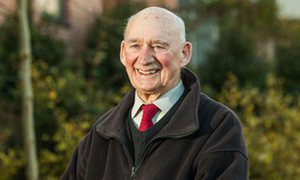
An 89-year-old Englishman has taken out an ad seeking a part-time job, so that he can experience the dignity and independence of work – and get off of public assistance.
Joe Bartley, a World War II veteran, caught the UK’s attention after he placed the following advertisement in his hometown newspaper, the Herald Express:
Senior citizen 89 seeks employment in Paignton area. 20hrs+ per week. Still able to clean, light gardening, DIY and anything. I have references. Old soldier, airborne forces. Save me from dying of boredom!
Bartley served in the armed forces before going into the private sector. He briefly retired at the age of 70, but within months he took another job, which he relinquished at the age of 83.
Two years ago his wife, Cassie, died, and without family he found himself alienated and bored watching the “guff” on television. He’d rather have a job, “meeting people, making friends” while being productive. “I want a purpose to go out and the pride of having a job to go to five or six days a week,” he said.
He also wants to stop relying on the government to pay his rent. If he could work, “I would feel more like Joe,” Mr. Bartley said. “Now I don’t feel like Joe, because I’ve got to depend on the council for rent and everything else.”
“I am on housing benefit but I would much rather work and pay my own way, which I have done my whole life. I am old fashioned like that,” he said.
His words are proof that Britain’s greatest generation still has lessons to teach the world.
As Mr. Bartley knows, working provides physical and psychological benefits. A 2009 study “found that employed retirees report levels of health, well-being, and life satisfaction on par with those who have not yet retired — despite age differences.” A nation such as the UK, facing the challenges of a government-run healthcare system, has every incentive to improve the health of its elderly. Sadly, in the United States, Social Security discourages work, especially among its youngest (and presumably healthiest) retirees.
His generation’s increasingly inert progeny should note the emptiness of anonymous, atomized entertainment. One study found that “social isolation is a major risk factor for mortality from widely varying causes.” Truly, “it is not good for man to be alone.” On the other hand, numerous researchers have discovered that people’s sense of well-being correlates with their points of social connection – especially relationships that carry responsibilities to others. Co-workers and employers can provide such relationships.
Irrespective of the transient emotional aspects of any given workplace, labor itself ennobles the laborer. That is one fundamental point that Pope Francis understands. “We get dignity from work,” he said this year. “Work is fundamental to the dignity of the person. Work … fills us with dignity, makes us similar to God Who has worked and still works.”
If work – even well past retirement age – brings life and well-being, then idleness and government dependence produce the opposite effects. Pope Emeritus Benedict XVI wrote in Caritas in Veritate that being “dependent on public or private assistance for a prolonged period undermines the freedom and creativity of the person and his … social relationships, causing great psychological and spiritual suffering.” Psychological studies found that leaving welfare had a positive mental and emotional impact on the newly employed.
Although he certainly earned his retirement, this octagenarian’s story shows the longing for independence and self-sufficiency knows no age limit – and sees no honest work as unseemly. “Even though I am 89, I can still work,” he said. “I can work a hoover; I can clean tables, some gardening – anything really.”
Mr. Bartley clearly recognizes how his labor adds value to others and sees that the road to relieving his sorrow lies in serving others.
He said he wants to work 20 to 25 hours a week, not merely perform odd jobs. As of this writing, he is said to be fielding several offers.
“I like a laugh – and I like a happy ending,” he said.
Here’s hoping he gets one.
The principles that defined the West will be the subject of the Acton Institute’s “Crisis of Liberty in the West” Conference at the Bloomsbury Hotel in London on Thursday, December 1. The conference is free but its sponsors – the Acton Institute; the Institute of Economic Affairs; and St. Mary’s University, Twickenham – require all attendees to register in advance. You can register here or watch a Livestream the day of the conference.

